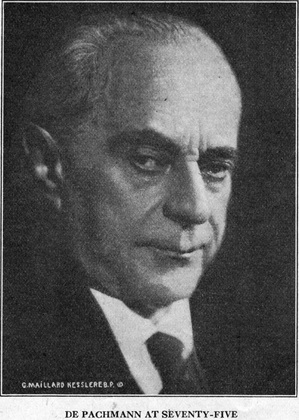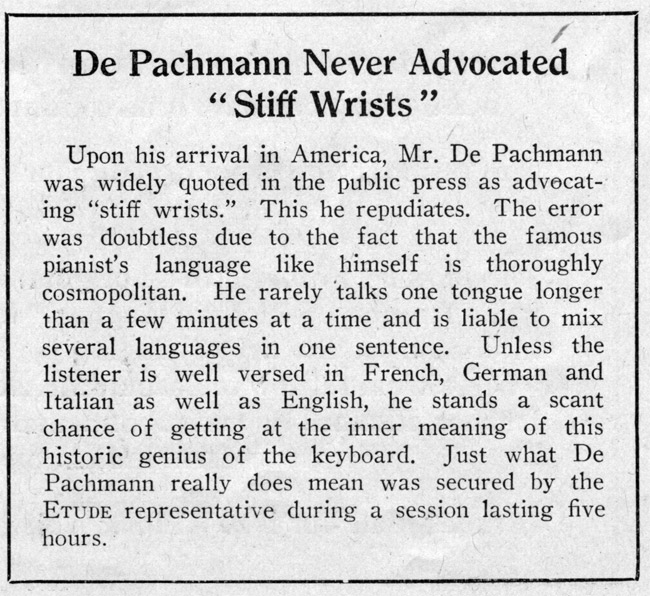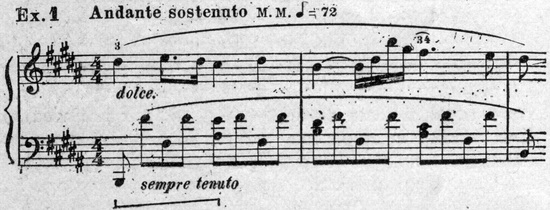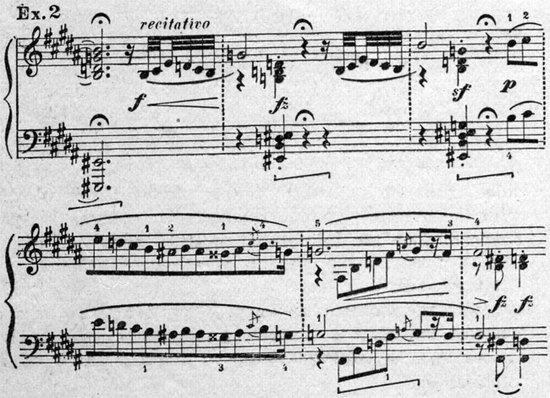An Interview Secured Exclusively for the Etude With the Famous Virtuoso
VLADIMIR DE PACHMANN
Who at the Age of Seventy-five Has Remolded His Entire Repertoire According to New Principles Which He Claims Are of Paramount Importance
 Editor’s Note: Vladimir De Pachmann was born in Odessa, July 27, 1848. At first he was a pupil of his father, who for years was a Professor of Roman Law at the University and a highly cultivated amateur violinist. Later, in 1886, he became a pupil of Dachs at the Vienna Conservatory. He has repeatedly created furores by his tours in Europe and in America. He was knighted by the Danish government in 1885 and in 1916 received the highly coveted Beethoven medal from the London Philharmonic Society. In I884 he married his former pupil, Maggie Oakey, a fine pianist and composer whose opera “Yato” was produced in Paris in 1913. After their divorce she became the wife of Fernand Labori, the noted French attorney who defended Dreyfus in the trial which startled Europe. De Pachmann is famed for his lovely velvety touch and his exquisite performances of Chopin.
Editor’s Note: Vladimir De Pachmann was born in Odessa, July 27, 1848. At first he was a pupil of his father, who for years was a Professor of Roman Law at the University and a highly cultivated amateur violinist. Later, in 1886, he became a pupil of Dachs at the Vienna Conservatory. He has repeatedly created furores by his tours in Europe and in America. He was knighted by the Danish government in 1885 and in 1916 received the highly coveted Beethoven medal from the London Philharmonic Society. In I884 he married his former pupil, Maggie Oakey, a fine pianist and composer whose opera “Yato” was produced in Paris in 1913. After their divorce she became the wife of Fernand Labori, the noted French attorney who defended Dreyfus in the trial which startled Europe. De Pachmann is famed for his lovely velvety touch and his exquisite performances of Chopin.
“It is regrettable that any newspaper should have quoted me as saying anything so outrageous as that I approved of playing the king of instruments, the piano, with stiff wrists. Before attempting to explain the new principles upon which I have seen fit to re-work my entire repertoire, let me say that it is impossible to play the piano with stiff wrists and produce anything but execrable results. Flexible wrists are the basis of all good piano playing; and it would be mad for anyone who has been before the public as a virtuoso for half a century to say anything to the contrary. I have heard all of the great pianists of my time and those who have achieved the most artistic results are those who have had least constraint at the wrist joint.
“When I arrived in this country early in the fall, I was overwhelmed by reporters who were only too anxious too secure something sensational and who in most cases seemed totally ignorant of the piano, to say nothing of the art of music when considered on a lofty plane. They utterly misinterpreted my thought; and if I now make a statement of the most emphatic kind it would be that the new principles I have been working upon are the very opposite of anything like a stiff wrist. I realize that such a false statement might become current and do a great deal of damage; and therefore I am glad of this opportunity to express myself exactly upon these most important points.
Piano Most Complete Instrument
“When I first commenced the study of music I was six years old. My father was a violinist and a man of great foresight. Naturally, he taught me the violin; and it was not until I was ten years old that he saw that my chief interest was in the piano. Then he started to teach me the piano. The piano is the finest solo instrument in the world; because it is complete. It is even more complete than the organ because its keyboard, its normal expressive range, is greater although its variety of tone is not as great as that of the organ. I have never liked any of the other solo instruments as such. In the combination of the grand orchestra they are magnificent; but otherwise they seem incomplete to me.
“In my early pianistic training my father was too much concerned in teaching me music to take any time with the niceties of touch or technic. Of hand position I knew nothing. My texts at the beginning were the ordinary instruction books. If I remember rightly, they were those of Muller or Adams, the ancestors of thousands of similar books which have appeared since then and are so necessary in introducing the little child to the mysteries of music and the keyboard.
Study as Much Music as You Possibly Can
“The main thing in early training is to master as much music as you can. The repertoire of the instrument is enormous. My father was a critic but not a pianist. He merely advised me but could not show me how. I studied everything that came my way. How long did I practice? It would be easier to find out how long I didn’t. I was at work at it all the time. Good health permitted me to work enormously. I felt that either you play or you don’t. If I was to encompass the great art, all the time was none too much for me to work. Of course, the student must grade his work and it is a great mistake to jump ahead to greater difficulties until one has mastered one grade and played an enormous amount of music in that. Now music is very cheap; and I would advise the student to play everything he can lay his hands upon, just as a hungry boy devours a meal. If he encounters a difficulty and it does not disappear after one hundred repetitions he should play it a thousand times. Artistic and pianistic ideals of touch, tone, phrasing, nuance, fingering must be held at the highest possible level and never given up until they are as fine as possible.
“I studied, largely by myself, Bach, Beethoven, Chopin and the then popular Thalberg, everything. Working alone, it was necessary for me to do a great deal and the student who is pining for a great teacher may, in this day of low-priced music, work by himself and acquire a technic and a repertoire which would put to shame some of the students who use a teacher as a kind of crutch. This was certainly my own experience. Everything depends upon your deep-seated love for the art your willingness to sacrifice and your endurance. If you can not have a teacher, do not think of giving up, but work, work, work! Let me recount my own experience when I went to Dachs.
“Dachs was considered one of the greatest piano teachers of his day. He had been a pupil of Czerny and was a most careful and exacting pedagog. When I was twelve years old my brother made me a birthday present of the Forty-eight Fugues of the “Well-tempered Clavichord” of Bach. I adored them as study material. When I went to Dachs for my two lessons a week he assigned me two fugues for the first one. When I came I asked what key he would like to hear them played in. He thought this was a joke and named a difficult key. But after I had played them he called in the director of the conservatory and had him listen. Then I told him that I could play any of the fugues in any key and they were both amazed. I cite this merely to show the student who is struggling along without a high-priced teacher that even the authorities of a great conservatory can be astonished by what real love for playing and hard work can produce. Of course, I played the fugues from memory. After this I played for them the Chopin Sonata in B Minor and they saw that a very different course would have to be devised for me. Many of the graduates of the conservatory, with all the advantages of years of study under great experts, could not have done as much as I did virtually alone. The instruction in those days was two golden a lesson. Alas! what would four kronen buy in Austria now?

The Real Secret
“Piano students are always looking for some great secret of success. There are no real secrets but love of the art and enormous work. This must of course be combined with thoroughly natural conditions of the hand and arm which I shall describe later with some detail. Even to-day, at the age of seventy-five, I find that I must practice five or six hours a day. This has been made necessary by the fact that I have reworked down to the finest detail my entire repertoire; and I refuse to play a piece unless this has been done. I have no charlatan’s trick to sell at great price. It is all so simple that I cannot see why some one has not chanced upon this fundamental principle before. Since I have been playing in this way critics in European centres have made more flattering comments than ever before and have been making comparisons with great pianists of the past and present which are superlative.
Fluidity in Playing
“During my three-score and fifteen years I have heard many times all the great pianists of the day. I have watched them closely. Liszt himself attended my first concert in Budapest. He sat in the first row; and after the concert we had supper together in my quarters. At the end of the concert he came upon the stage and congratulated me most effusively, even going so far as saying, ‘I wish that Chopin had heard you play.’ Later in the evening I played his arrangement of Auf Flügeln des Gesangcs and he said, ‘So, I like it,’ with great enthusiasm. He then played his arrangement of Chopin’s Chant Polonaise. I shall never forget it. It was like some wonderful voice singing. Liszt was transcendentally the greatest of all pianists. He played like a god.
“Later I met Liszt at his home in Rome, during a time when Richard Wagner was staying with him. I had the honor of playing for both of them. I played the Chopin Ballade in G minor and was again overwhelmed by the generous praise of both. Liszt insisted that I played it better than Chopin who had mannerisms in his playing at times.
“During all these years it seemed to me that the greatest method of playing the piano was that in which the masterpiece to be interpreted could be permitted to come from the soul of the interpreter to the instrument with the greatest possible fluidity. Of course, this presupposes that the interpreter must be possessed of the highest musicianship and an all-adequate technic. Yet I always felt that there was something which impeded the message, something which clogged up the lines of muscles and nerves. This very thought preyed upon me for years. I could not sleep at night because of it.
Thinking did not seem to solve the problem; because I knew that there must be some fundamental principle underlying the whole thing. Inspiration did what thinking would not do; and I discovered that the whole trouble lay in the wrist. The wrists were not free. Easily said—but WHY?
“Perhaps a simple experiment will serve to illustrate. Put your elbow upon the table and let your forearm fall with your hand in comfortable playing condition. Do not curve the fingers too much, because that is unnatural.
“Now, with the hand and forearm in this position, move the hand (without moving the forearm) as far as possible to the left and hold it in that position for a few moments. You will notice at once that there is a strain at the joint of the wrist. Now move the hand in the opposite direction and there is likewise a strain. It is this strain that, to my mind, distorts the muscular and the nervous condition of the hand and the forearm and results in much horrible playing. The tone cannot be musical and beautiful if the wrist is stiff or strained in this manner. Therefore I never move the hand from side to side. The lateral movement occurs at the elbow or at the shoulder and not at the wrist. The hand is on a straight line with the arm. Is this ‘stiff wrists?’ On the contrary it is the very opposite, and the one sure remedy for stiff wrists. The hands and arms are always free and unconstrained.
“Having discovered this, I began to find that, whereas I had been unable to practice for long periods in later years without fatigue, I was now able to play for hours and hours and ‘never feel it.’
“What was the result? I resolved to rework, rearrange my entire repertoire upon this new basis. This meant refingering hundreds and hundreds of pages of music. You see, the music editors for the publishers are first of all fine musicians and only secondarily pianists. They do not understand and recognize the difficulties of the instrument. Even a great mind like von Bulow did not recognize this. If the music forced the hand into an awkward position it was immaterial. As a result of this they paid attention to indicating the harmonic structure of the work by writing the different parts or voices on different clefs, with little consideration for the pianist’s hand. Even in as highly pianistic a composer as Chopin, if one follows the best editions upon the market, the hand is often forced into painfully strained positions. I will not ‘spoil’ my playing hand in this way. If I encounter a passage which demands strain I work with it, refinger it, rearrange it until the strain disappears. This has obliged me to make thousands of changes of hand positions and fingerings.
“This adds difficulty at first; but the artistic reward is enormous. Take Chopin’s exquisite Nocturne in B Major and rework it yourself, remembering that there must be no disturbance of the normal position of the hand, no lateral movement at the wrists to squeeze the nerves and muscles and make your playing hard and unmusical.”
De Pachmann sat at the keyboard and played the lovely Chopin masterpiece with a dreamlike, songlike, velvetlike tone which is historic in this master of the instrument. Coming to the end, he stopped and said, “Here is something that Liszt told me, ‘When Chopin was writing this it was in a house in which were a number of young people. He heard them approaching. He was indignant at the disturbance and looked up and finished the nocturne thus:
“See,” exclaimed De Pachmann with emotion, handling a long grey Alpaca coat, ragged and bronzed with years, “this was Chopin’s own coat. It came to me through friends of George Sand. I have had it for years. It is over eighty years old. I take it with me everywhere. Is it not an inspiration even to touch something of so great a master?”





